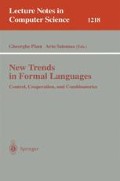Abstract
Mobile code technology leads to a new type of “open systems”: instead of applying openness to a standardization process we now require the running systems to become open for foreign code. The question then is how far this technical openness can go for mobile code. The less constraints we impose on hosts running mobile code, the more can the benefits of mobile code be exploited. However, there must necessarily be basic constraints regarding the utilization of resources which are always finite and most of the time will be operated near the saturation point. In this paper we argue in favor of openness even at the level of resource allocation. We link this topic to (open) market models, describe the mechanisms we developed so far for communication messengers and show how they are used to allocate resources in an open way. Finally we present experimental results of validation runs which help us testing these mechanisms.
Preview
Unable to display preview. Download preview PDF.
References
D. F. Ferguson, C. Nikolaou, and Y. Yemini. An economy for flow control in computer networks. In Proceedings of the IEEE Infocom-89, pages 110–118, 1989.
B. A. Huberman, editor. The Ecology of Computation. Elsevier, 1988.
Bernardo A. Hubermann. Computation as economics. Presentation at the Second International Conference in Economics and Finance. URL: http://www.unige.ch/ce/ce96/ps/huberman.eps, June 1996.
V. Jacobson. Congestion avoidance and control. In SIGCOMM'88 Conference on Communications Architectures & Protocols, pages 314–329, August 1988.
Guy Neuschwander. Exécution du code natif dans l'environnement Mos. Diploma thesis, University of Geneva, November 1996.
J. Sairamesh, D. F. Ferguson, and Y. Yemini. An approach to pricing, optimal allocation and quality of service provisioning in high-speed packet networks. In Proceedings of the IEEE Infocom'95, pages 1111–1119, 1995.
J. W. Stamos and D. K. Gifford. Remote Evaluation. ACMTPLS, 12(4), 1990, pages 537–565.
I. E. Sutherland. A futures market in computer time. CACM, 11(6), 1968.
Chr. F. Tschudin. Minimality as the Leitmotiv for mobile code. Presentation at the 2nd German Workshop on Mobile Agents (DeMAT-II). http://www.ifi.unizh.ch/groups/bauknecht/tschudin/research/demat96-eng.ps.gz, September 1996.
Chr. F. Tschudin, G. Di Marzo, M. Murhimanya, and J. Harms. Welche Sicherheit für mobilen Code? In K. Bauknecht, D. Karangiannis, and S. Teufel, editors, Proceedings der Fachtagung SIS'96 Sicherheit in Informationssystemen, pages 291–307, Vienna, March 1996. English abstract: http://www.ifi.unizh.ch/groups/bauknecht/tschudin/research/sis96-abstract.html.
Christian F. Tschudin. On the Structuring of Computer Communications. PhD thesis, Université de Genève, 1993. Thèse No 2632. ftp://cui.unige.ch/pub/tschudin/phd-{123}.ps.Z.
Christian F. Tschudin. MO — a messenger execution environment. Usenet newsgroup comp. sources. unix, Vol 28, Issue 51-62, June 1994. ftp://cui.unige.ch/pub/m0/m0-manual.ps.Z
C. A. Waldspurger, T. Hogg, B. A. Hubermann, J. O. Kephart, and W. S. Stornetta. Spawn: a distributed computational economy. IEEE Transactions on Software Engineering, 18(2): 103–117, February 1992.
Carl. A. Waldspurger and William E.Weihl. Lottery scheduling: Flexible proportional-share resource management. In First Symposium on Operating System Design and Implementation (OSDI, Usenix Association, pages 1–11, 1994.
Author information
Authors and Affiliations
Editor information
Rights and permissions
Copyright information
© 1997 Springer-Verlag Berlin Heidelberg
About this paper
Cite this paper
Tschudin, C.F. (1997). Open resource allocation for mobile code. In: Rothermel, K., Popescu-Zeletin, R. (eds) Mobile Agents. MA 1997. Lecture Notes in Computer Science, vol 1219. Springer, Berlin, Heidelberg. https://doi.org/10.1007/3-540-62803-7_34
Download citation
DOI: https://doi.org/10.1007/3-540-62803-7_34
Published:
Publisher Name: Springer, Berlin, Heidelberg
Print ISBN: 978-3-540-62803-3
Online ISBN: 978-3-540-68695-8
eBook Packages: Springer Book Archive

